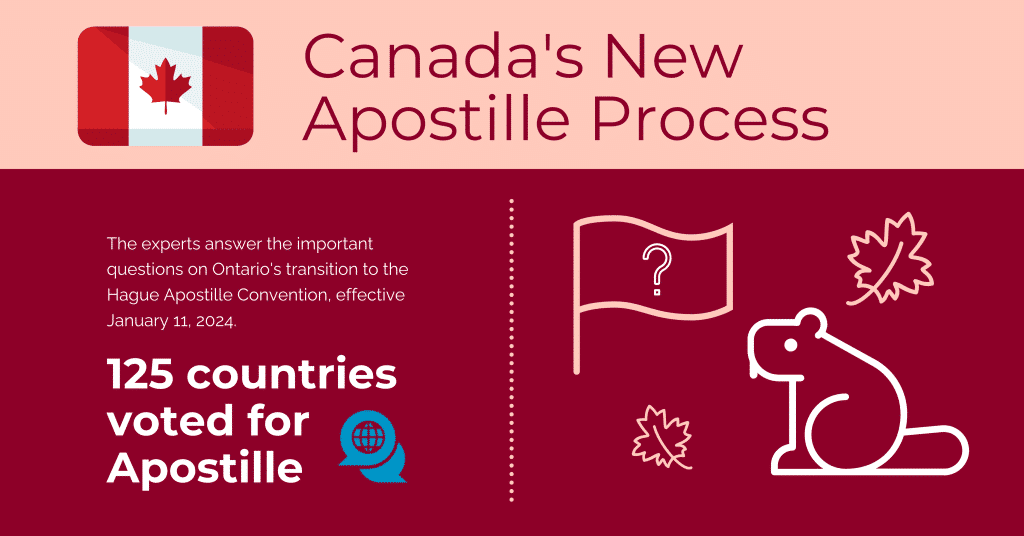
A Comprehensive Guide to Apostille Services in Canada
Table of Contents
- What is an Apostille?
- Understanding the Hague Apostille Convention
- Canada's Authentication and Legalization Process
- Steps to Authenticate and Legalize Documents in Canada
- Frequently Asked Questions About Apostille in Canada
- How to Choose a Reliable Apostille Service Provider in Canada
- Conclusion Trust The Experts @ Global Document Solutions
What is an Apostille?
An apostille is an official certificate issued by a designated authority, attesting the authenticity of a public document. It ensures that public documents, such as birth certificates, marriage certificates, or diplomas, are recognized and accepted in other countries that are members of the Hague Apostille Convention.
Understanding the Hague Apostille Convention
The Hague Apostille Convention, also known as the Apostille Treaty or the Convention of 5 October 1961 Abolishing the Requirement of Legalization for Foreign Public Documents, is an international treaty designed to simplify the process of document authentication for use in foreign countries. Member countries of the Convention recognize the apostille as a valid certification, eliminating the need for further authentication or legalization procedures.
graph LR A[Hague Apostille Convention] B[Member Countries] C[Apostille Certificates] D[Public Documents] E[International Recognition] A -- Streamlines Process --> B B -- Issue --> C C -- Authenticate --> D D -- Accepted in --> E
Canada's Authentication and Legalization Process
Since Canada is not a member of the Hague Apostille Convention, it follows a different process known as authentication and legalization. This two-step process is equivalent to an apostille, and it is recognized and accepted by foreign countries.
Authentication
Authentication is the first step in Canada's document authentication and legalization process. It involves verifying the signature and seal on the public document by an authorized official, usually from Global Affairs Canada (GAC). Once the document has been authenticated, it receives a stamp or certificate confirming its authenticity.
Legalization
After authentication, the document must be legalized by the foreign country's embassy or consulate in Canada. The embassy or consulate reviews the authenticated document to ensure it meets their country's requirements, and then they affix their stamp or seal to officially legalize the document for use in their country.
Steps to Authenticate and Legalize Documents in Canada
- Prepare the documents: Ensure that your public documents are original, complete, and meet the requirements of the foreign country where they will be used.
- Authenticate the documents: Submit your documents to Global Affairs Canada (GAC) for authentication, either by mail or using a professional service.
- Legalize the documents: Once your documents have been authenticated, submit them to the foreign country's embassy or consulate in Canada for legalization.
- Collect and use the documents: After the legalization process is complete, retrieve your documents and use them as required in the foreign country.
Frequently Asked Questions About Apostille in Canada
Can I get an apostille in Canada?
No, Canada is not a member of the Hague Apostille Convention. Instead, Canada follows the authentication and legalization process, which is internationally recognized and accepted.
Are apostilles and the authentication and legalization process equivalent?
Yes, both processes serve the same purpose of verifying the authenticity of public documents for use in foreign countries. Although the process may differ, the end goal of enabling public documents to be recognized and accepted internationally remains the same.
How long does the authentication and legalization process take?
The time required for the authentication and legalization process can vary depending on the complexity of the documents, the workload at Global Affairs Canada (GAC), and the requirements of the foreign embassy or consulate. Generally, the process can take anywhere from a few days to several weeks.
Can I use an authenticated and legalized document in any country?
An authenticated and legalized document is valid for use in the country whose embassy or consulate legalized the document. If you need to use the document in multiple countries, it may require legalization by each country's embassy or consulate.
How to Choose a Reliable Apostille Service Provider in Canada
When selecting a service provider to assist with the authentication and legalization process, consider the following factors:
- Experience and Expertise: Choose a provider with a proven track record of successfully handling document authentication and legalization.
- Accreditation and Reputation: Look for a provider with a strong reputation, positive customer reviews, and membership in recognized industry associations.
- Efficiency and Timeliness: Seek a provider that offers fast turnaround times and can accommodate your specific deadlines.
- Customer Service: Select a provider with responsive and knowledgeable customer support, who can guide you through the process and answer any questions you may have.
- Transparency and Pricing: Opt for a provider that offers clear pricing and fee structures, without hidden costs or unexpected charges.
Conclusion Trust The Experts @ Global Document Solutions
While Canada does not issue apostilles due to its non-membership in the Hague Apostille Convention, the authentication and legalization process serves as an equivalent method for validating public documents for international use. By understanding the steps involved in this process and selecting a reliable service provider, you can ensure your documents are properly authenticated and legalized for acceptance in foreign countries.

